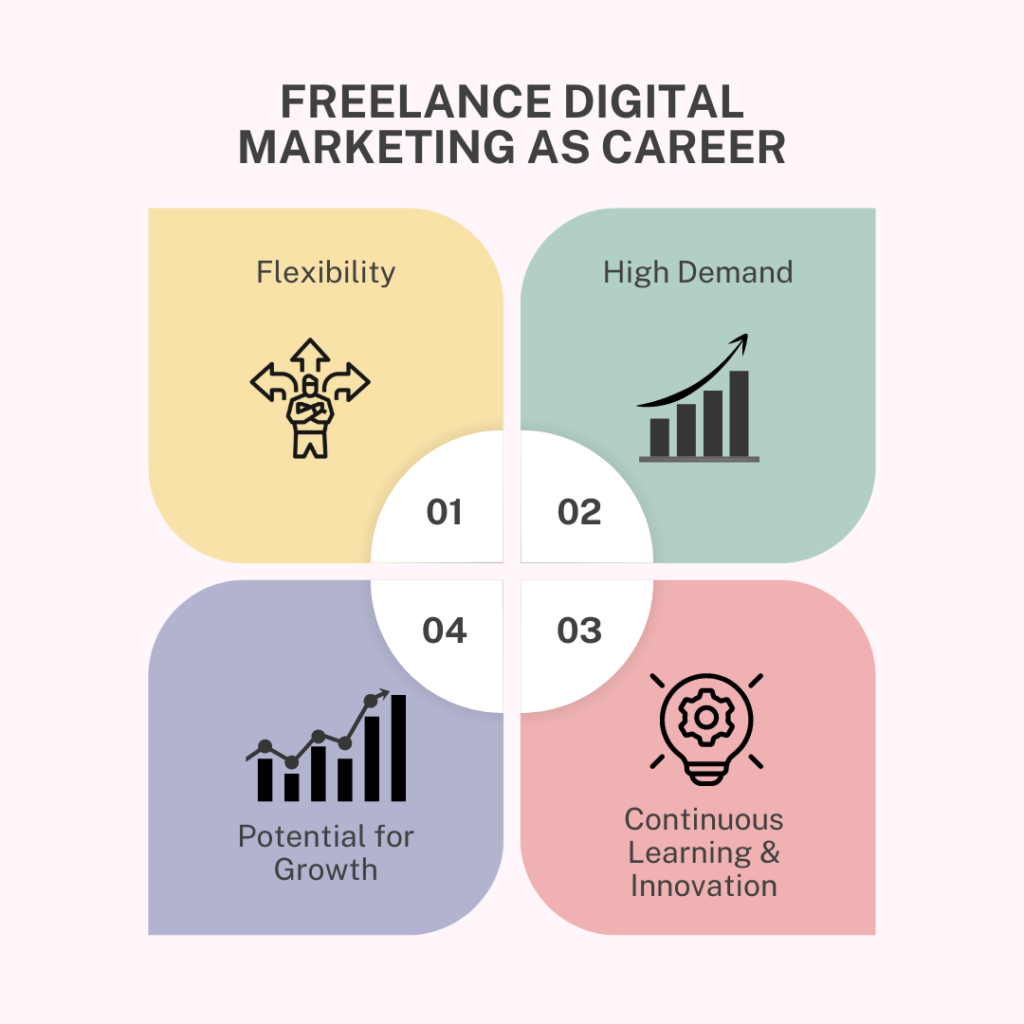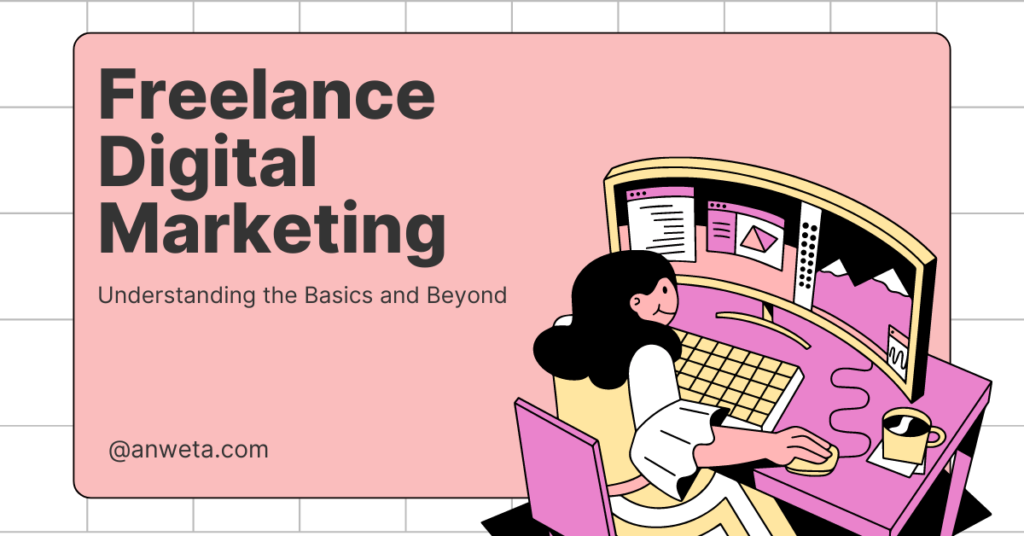In today’s digital age, more businesses are realizing the need for a strong online presence, which has created vast opportunities for freelance digital marketers. Freelancing in digital marketing is one of the most flexible, dynamic, and rewarding career paths available. Whether you’re a marketing enthusiast looking to build a career or a professional thinking of going solo, freelancing in digital marketing offers the freedom to work on your terms while helping businesses grow.
In this comprehensive guide, we will dive into what a freelance digital marketer does, how to start a digital marketer career in freelancing without experience, why it’s a good career option, and how beginners can begin their journey in digital marketing as career option.
Table of Contents
What is a Freelance Digital Marketer?
A freelance digital marketer is a self-employed professional who offers marketing services to clients on a project basis, rather than working for one company. Freelance digital marketers specialize in areas like SEO (Search Engine Optimization), PPC (Pay-Per-Click) advertising, social media marketing, content creation, email marketing, and more.
Unlike traditional in-house marketers, freelancers have the flexibility to work with various clients from different industries. They can choose their projects, set their own rates, and work from anywhere—making freelancing in digital marketing an appealing choice for individuals looking for both independence and financial growth.
How one can become a Freelance Digital Marketer
Making a successful freelance digital marketer as career requires a mix of practical skills, knowledge, and perseverance. Here’s a guide to help you begin:
1. Learn Digital Marketing Fundamentals
Before diving into freelancing, it’s essential to understand the core areas of digital marketing, such as:
– SEO: Learn how search engines work and how to optimize websites to rank higher on Google.
– Content Marketing: Focus on creating valuable content that attracts and engages target audiences.
– Social Media Marketing: Understand how to leverage platforms like Facebook, Instagram, LinkedIn, and Twitter for business growth.
– Email Marketing: Learn how to create effective email campaigns to nurture leads and retain customers.
– PPC Advertising: Understand how to set up and manage paid campaigns on platforms like Google Ads and Facebook Ads.
Several online resources and certifications can help you gain the necessary knowledge. Google’s Digital Garage, HubSpot Academy, SEMrush and more more websites offer free courses that cover essential digital marketing concepts.
2. Choose a Niche or Specialization
While having a general understanding of digital marketing is important, specializing in a specific area can set you apart in a competitive market. For example, you could focus on SEO, content marketing, or social media strategy. Picking a niche helps you build expertise, which will make you more attractive to potential clients.
3. Build Your Portfolio
A portfolio is essential for demonstrating your skills and attracting clients. If you’re lacking experience, consider offering free services or working on personal projects to develop your portfolio. Create sample projects like blog posts, social media campaigns, or SEO audits to demonstrate your capabilities. Your portfolio should highlight the value you bring and how you can help businesses achieve their goals.
4. Create a Personal Brand
As a freelancer, your personal brand is your biggest asset. Develop a professional website where potential clients can view your services, portfolio, and testimonials. Use LinkedIn and other social media platforms to connect with other professionals in your industry and share insights about digital marketing trends. Consistently building your online presence will help you gain credibility and visibility.
5. Set Your Rates
Setting prices for your services can be challenging when you’re just starting out. Research industry standards and set competitive rates based on your skill level, experience, and niche. When setting your rates, consider whether you’ll charge per hour or per project. As you gain more experience and build a strong reputation, you can gradually increase your fees.
6. Network and Market Yourself
Networking is crucial in the freelance world. Join online communities, attend webinars, and participate in digital marketing forums where you can connect with potential clients. You can also use freelance platforms like Upwork, Fiverr, or Freelancer.com to find projects. Market yourself by consistently promoting your skills, sharing valuable content, and offering to help others in digital marketing spaces.
How to Start Freelancing in Digital Marketing with No Experience
Starting digital marketing as career without prior experience can feel overwhelming, but it’s entirely possible with the right approach.
1. Educate Yourself
The first step is to educate yourself thoroughly in digital marketing. Leverage free and paid online courses to build foundational skills. Certifications in digital marketing from platforms like Google, HubSpot, Udemy or Coursera can also enhance your credibility and make you more attractive to potential clients.
2. Gain Hands-On Experience with Personal Projects
Work on personal projects to gain practical experience. For example, you can create your own blog, build a website, or run a small social media campaign for a personal brand or local business. These projects will help you practice key skills and provide material for your portfolio.
3. Volunteer or Offer Services for Free
In the beginning, you may need to offer your services for free or at a reduced rate to gain experience. Reach out to non-profits, small businesses, or startups that need help with digital marketing. The work you do for them will not only add to your portfolio but also give you valuable real-world experience.
4. Use Freelance Platforms
Freelance platforms like Upwork, Fiverr, and Freelancer.com offer a great way to find entry-level jobs and projects. While you might not get high-paying clients initially, working through these platforms can help you gain experience, build reviews, and slowly grow your client base.
5. Focus on Building Relationships
Freelancing isn’t just about landing a project; it’s about building long-term relationships with clients. Delivering quality work, meeting deadlines, and maintaining professional communication can lead to repeat business and referrals, even if you start with smaller projects.
Is Digital Marketing as Career a Good Choice?
Freelancing in digital marketing is a highly promising career choice for several reasons:
1. Flexibility
One of the most attractive aspects of freelancing in digital marketing is the flexibility it offers. You have the flexibility to set your own schedule, select your projects, and work from any location. This flexibility makes freelancing a popular option for those seeking work-life balance or looking to escape the traditional 9-to-5 structure.
2. High Demand
As businesses continue to shift towards digital platforms, the demand for digital marketing experts is higher than ever. Whether it’s SEO, content marketing, social media strategy, or email marketing, businesses need skilled freelancers to help them navigate the digital landscape.
3. Potential for Growth
Freelance digital marketing offers great earning potential. While it might take time to establish a steady stream of clients, successful freelancers often charge premium rates for their expertise. Over time, you can grow your business, expand your client base, and even hire subcontractors to help manage workloads.
4. Continuous Learning and Innovation
The digital marketing industry is always changing, providing continuous opportunities to learn something new. Freelance digital marketers are always exposed to new tools, strategies, and trends, making it an exciting and intellectually stimulating career.

Pursue a Digital Marketer Career by Working Remotely
One of the biggest perks of freelancing in digital marketing is the ability to work from home. All you need is a laptop and an internet connection, allowing you to work from anywhere in the world. This flexibility is perfect for individuals who prefer a remote work environment, want to travel, or need a flexible schedule.
However, working from home also comes with challenges. Managing your time, staying motivated, and maintaining work-life boundaries can be difficult when you’re not in a structured office environment. To succeed, it’s important to set up a dedicated workspace, create a routine, and use productivity tools like Trello, Asana, or Slack to stay organized.
How Do Beginners Start Digital Marketing?
Starting digital marketing as career option can feel overwhelming for beginners, but with the right approach, it’s achievable.
1. Start with a Strong Foundation
If you’re new to digital marketing, the first step is to build a solid understanding of the field. Start by learning the fundamentals of SEO, content marketing, social media marketing, and paid advertising. Taking online courses, reading blogs, and watching YouTube tutorials can provide valuable insights and practical knowledge.
2. Practice What You Learn
To truly understand digital marketing, it’s important to apply what you learn. Create your own website, start a blog, or manage social media profiles to test out different strategies. If you’re interested in SEO, try optimizing a few pages and tracking the results. If social media marketing excites you, create a content calendar and schedule posts for a month.
3. Stay Updated on Industry Trends
The digital marketing landscape changes rapidly, with new tools, algorithms, and trends emerging frequently. Subscribe to industry newsletters, follow thought leaders on social media, and join marketing communities to stay informed. Platforms like Moz, SEMrush, and HubSpot offer valuable insights and keep you updated on the latest trends.
4. Get Certified
Many organizations offer free or paid certifications in digital marketing. Obtaining certifications both showcases your expertise and enhances your professional standing. Platforms like Google, HubSpot, and Facebook provide certifications that are widely recognized in the industry.
5. Network with Professionals
Connecting with other digital marketers can help you learn, share ideas, and find job opportunities. Join LinkedIn groups, attend webinars, or participate in digital marketing forums to engage with like-minded professionals.
6. Offer Services at Discounted Rates
When you’re starting out, gaining practical experience is more important than earning money. Offer your services at discounted rates or for free to build your portfolio. Over time, as you gain more experience and confidence, you can start charging higher rates for your services.
7. Leverage Freelance
Advanced Strategies for Freelancing in Digital Marketing
As you progress in your freelance digital marketer career, adopting advanced strategies can significantly enhance your effectiveness and client satisfaction. Here are some advanced strategies to explore:
1. Data-Driven Decision Making
Leveraging data is crucial for optimizing your marketing strategies and demonstrating value to clients.
– Analytics Tools: Use tools like Google Analytics, SEMrush, and Hotjar to track and analyze user behavior, campaign performance, and website metrics. Analyzing data enables you to make informed decisions and fine-tune your strategies.
– A/B Testing: Implement A/B testing to compare different versions of a webpage, email, or ad to determine which performs better. This helps in optimizing conversion rates and improving ROI.
2. Advanced SEO Techniques
SEO is a continuously evolving field. Staying updated with advanced techniques can give you an edge.
– Technical SEO: Focus on technical aspects like site speed, mobile-friendliness, and structured data. Tools like Screaming Frog and Google Search Console can help identify and fix technical issues.
– Content Clusters: Develop content clusters around core topics to improve your site’s authority and relevance. Group related content into clusters linked by a central pillar page.
3. Effective Use of Marketing Automation
Marketing automation can streamline your processes and enhance your efficiency.
– Email Automation: Use tools like Mailchimp or HubSpot to set up automated email workflows for lead nurturing, onboarding, and re-engagement.
– Social Media Scheduling: Platforms like Hootsuite or Buffer allow you to schedule posts, track engagement, and analyze performance, helping you manage multiple accounts more efficiently.
4. Leveraging Artificial Intelligence
AI is becoming increasingly integrated into digital marketing strategies.
– Predictive Analytics: Utilize AI to examine historical data and forecast future trends, aiding in the prediction of sales, customer behavior, and market developments.
– Chatbots and Virtual Assistants: Implement AI-driven chatbots to handle customer queries, provide instant responses, and improve user experience on your clients’ websites.
5. Content Marketing Innovations
Content marketing continues to evolve with new formats and technologies.
– Interactive Content: Incorporate interactive elements such as quizzes, polls, and interactive infographics to engage users and collect valuable data.
– Video Content: Invest in high-quality video production, including live streams, webinars, and explainer videos. Interactive videos with clickable elements can also enhance user engagement.
6. Strategic Social Media Management
Effective social media management involves more than simply posting content.
– Social Listening: Use tools like Brandwatch or Mention to monitor social media conversations about your clients’ brands. This helps in understanding audience sentiment and identifying potential opportunities or issues.
– Influencer Collaboration: Develop strategic partnerships with influencers who align with your clients’ brand values. Influencer collaborations can drive brand awareness and reach new audiences.
7. Building Long-Term Client Relationships
Maintaining strong relationships with clients is key to long-term success in freelancing in digital marketing.
– Regular Communication: Schedule regular check-ins and updates with clients to discuss progress, challenges, and opportunities. This ensures clients stay informed and engaged in the decision-making process.
– Value-Added Services: Offer additional services or insights beyond the scope of the initial project. This demonstrates your commitment to their success and can lead to more opportunities.
8. Scaling Your Freelance Business
As your freelance business grows, scaling effectively is crucial.
– Outsourcing and Delegation: Consider outsourcing tasks to other freelancers or agencies when your workload increases. Delegating tasks allows you to focus on strategic activities and grow your business.
– Creating Standardized Processes: Develop standardized processes and templates for recurring tasks. This increases efficiency and ensures consistency across projects.
9. Continuing Education and Professional Development
Maintaining an edge in digital marketer career demands ongoing learning.
– Industry Conferences and Workshops: Attend industry conferences, workshops, and webinars to learn about the latest trends and network with other professionals.
– Certifications and Courses: Pursue advanced certifications and specialized courses in areas like advanced SEO, data analytics, and content strategy to enhance your expertise.
10. Ethical Marketing Practices
Adhering to ethical practices is essential for building trust and credibility in Freelancing in Digital Marketing.
– Transparency: Be transparent about your methods, pricing, and any potential conflicts of interest. Honest communication fosters trust and long-term relationships with clients.
– Data Privacy: Ensure that you comply with data privacy regulations such as GDPR and CCPA. Protecting client and user data is crucial for maintaining ethical standards.
Building a Strong Freelance Brand
A strong personal brand for freelancing in digital marketing can set you apart from competitors and attract high-quality clients.
– Unique Selling Proposition (USP): Clearly define what makes you different from other digital marketers. Your USP should highlight your unique skills, experience, or approach.
– Content Marketing: Share valuable content related to digital marketing on your blog, social media, or industry forums. Providing insights and tips positions you as an expert in your field.
Managing Work-Life Balance in Freelancing in Digital Marketing
Maintaining a healthy work-life balance is important for long-term success and well-being, for any employ be it a digital marketer career option.
– Set Boundaries: Establish clear boundaries between work and personal life. Create a designated workspace and set specific working hours to avoid burnout.
– Self-Care: Prioritize self-care and wellness. Regular breaks, exercise, and hobbies help manage stress and keep you motivated.
Platforms
Platforms like Upwork, Fiverr, and Freelancer offer a great starting point for beginners. Start by applying for smaller projects, even if the pay isn’t high. These platforms allow you to build a reputation through client reviews, and once you have a strong profile, you can attract higher-paying clients.
Future Trends in Freelance Digital Marketing
Staying informed about future trends about digital marketing as career, that can help you stay ahead in the industry.
– Blockchain Technology: Blockchain may impact digital marketing by enhancing data security and transparency in ad transactions.
– 5G Technology: The rollout of 5G networks will enable faster internet speeds, impacting how users consume content and interact with digital platforms.
Conclusion
Freelancers thrive in this space by staying up-to-date with the latest trends, continuously refining their skills, and building a strong online presence to attract new clients. Freelancing in digital marketing not only requires technical know-how but also a deep understanding of client needs and the ability to create effective, result-oriented strategies.
In this ever-evolving field of Digital Marketing as career, freelancers must keep honing their skills across different digital marketing platforms and channels, ensuring they remain competitive and capable of delivering results. Whether you’re managing SEO for an eCommerce website or running a social media campaign for a local brand, freelancing in digital marketing provides the opportunity to make a significant impact while enjoying the freedom of self-employment.
Freelancing in digital marketing offers a world of opportunities for those who are willing to learn, adapt, and grow. Whether you’re looking to start fresh with no experience or transition from a traditional marketing role, opting digital marketing as career provides flexibility, independence, and high earning potential.
With the demand for digital marketing on the rise, now is the perfect time to embark on a digital marketer career in freelancing. By educating yourself, building a strong portfolio, and consistently networking, you can turn freelancing into a lucrative and rewarding career.
So, if you’re ready to take control of your professional life, start exploring the world of freelancing in digital marketing today!

